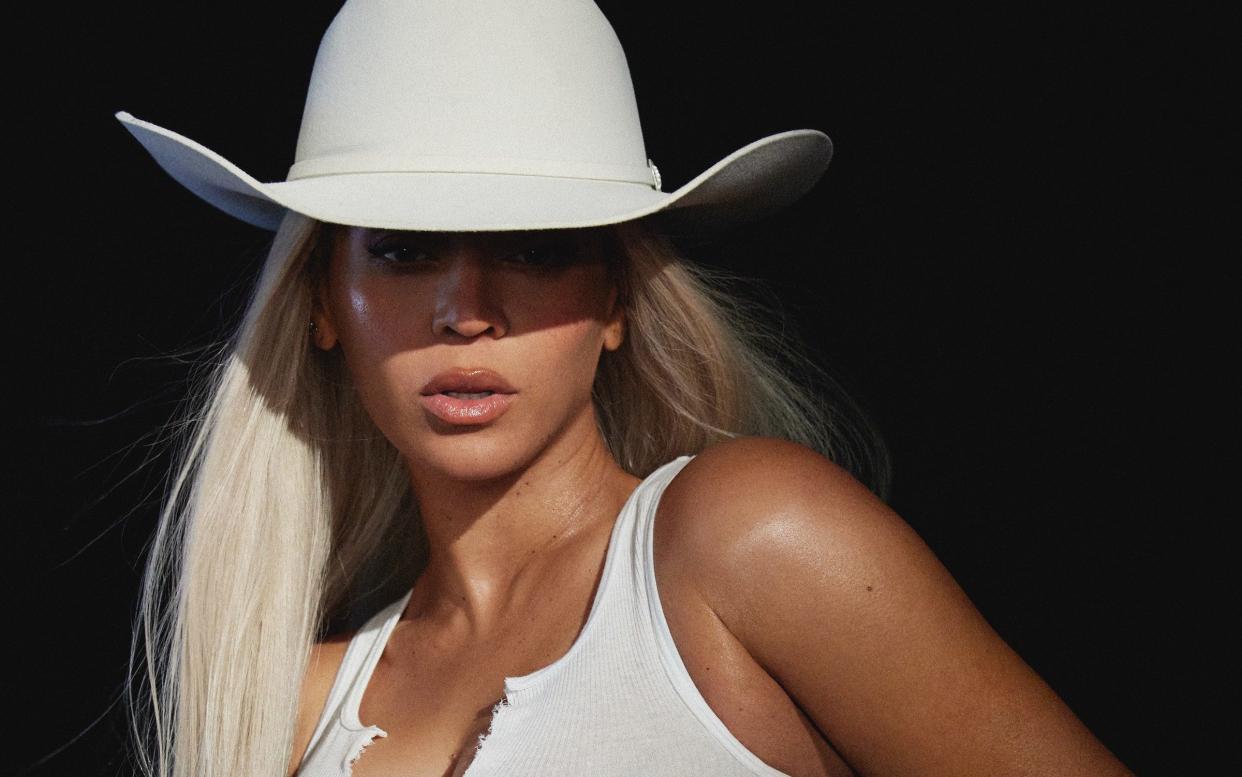Beyoncé, Cowboy Carter, review: the Texan superstar reinvents Jolene – and country music

- Oops!Something went wrong.Please try again later.
- Oops!Something went wrong.Please try again later.
- Oops!Something went wrong.Please try again later.
Advance publicity has proposed that RnB superstar Beyoncé’s eighth solo offering, Cowboy Carter, would be her country album, suggesting a rather timeworn and cynical showbiz tradition of paying respect to established genres to conquer different demographics. Indeed, the sight of the most famous black American woman in contemporary culture donning a Stetson for global chart-topping single Texas Hold Em these past weeks has been widely treated as a signifier of a worldwide pop shift towards this most conservative, white and all-American of roots musical formats.
Anyone looking forward to pedal-steel narratives of careworn domestic wisdom, campfire singalongs, square dance hoedowns, or the ubiquitous Disneyfied pop gloss of Nashville’s check shirt music factory should get their ear plugs out now. More broadminded listeners will be applauding with delight. From the bravura confrontational blast of opening epic American Requiem (that resembles Buffalo Springfield’s For What It’s Worth reshaped into a gospel choral electronic prog rock opus) it is clear that Beyoncé has come not to pay homage to country music but to transform it.
“They said I wasn’t country enough,” the Texan pop diva snaps imperiously, apparently still rankled by the cold shoulder treatment she received performing her country influenced song Daddy Lessons with the Dixie Chicks at the Country Music Association Awards in 2016. “Now’s the time to face the wind,” Beyoncé insists in a voice so full of tone and timbre, so replete with subtle micro notes and fluttery vocal shifts that even a threat sounds like seduction. What follows is 80 minutes and 27 tracks of dazzling, genre-defying songcraft, a twisted and magnificent psychedelic shapeshifting folk-rock hip-hop broadside against the conservatism of the country genre. Her married surname may be Carter, but Beyoncé Knowles picked it up when she wed rap superstar Jay Z, not because she became an honourary member of the original country Carter family, and it is clear where her allegiances lie.
With the croaky spoken voice of Willie Nelson offering sneaky verbal interjections in the guise of a stoned late night radio host (“Sometimes you don’t know what you like until someone turns you onto some real good s***”) and the endorsement of Dolly Parton (“Hey miss Honey B, it’s Dolly P”), Beyoncé has some big guns on her side, but she is certainly not overawed. Who else would be bold enough to completely rewrite Parton’s classic Jolene to give the famous narrative the voice of a modern woman rejecting victimhood, not “begging” but “warning” the seductive interloper not to come for her man? “I know I’m a queen, Jolene,” Beyoncé sings over tautly looped acoustic picking and a thumping beat. “There’s a thousand girls in every room / That act as desperate as you do.”
I can imagine the outrage of country purists as Beyoncé deigns to add a whole new bridge and second chorus section to this much love classic, but anyone taking issue might want to pay close attention to the sinister, atmospheric murder ballad Daughter that follows fast on its heels: “Your body laid out on these filthy floors / Your bloodstains on my custom couture,” she gently sings, before unleashing a skyscraping blast of what sounds like an 18th century operatic lament. Lyrically, alongside a reaffirmation of her black pride politics, Cowboy Carter offers compelling depictions of a volatile marriage in crisis and resolution. And (as Beyoncé demands to know) “if that ain’t country, tell me what is?”
There is a lot going on across Cowboy Carter, from the jerking confrontational surrealist rap of Spaghettii (with young country rapper Shaboozey and pioneering veteran black country star Linda Martell) to the expansive psyche Americana balladry of Alligator Tears and ripping dance floor romp of Ya Ya (imagine Outkast and Tina Turner performing a garage rock hip hop square dance interpolating Nancy Sinatra’s These Boots Are Made For Walkin’ and the Beach Boys’ Good Vibrations).
Yet it is all conceptually bound together, honouring the black roots of country (there are significant shout outs and interpolations of Sister Rosetta Tharpe and Chuck Berry), promoting black pride and confronting endemic racism, whilst pushing the palest of American music genres towards such mind-boggling Afrofuturism as the bizarre bounce and switch of Pharrell produced tri-part chant groove Sweet Honey Buckin. “Put some grits on the stove / Jiffy cornbread, booty corn fed / Body rolls at the rodeo / I’m coming home,” sings this 42-year-old Texas native, yet Beyoncé’s country home exists in a whole different dimension to anything that has claimed this heritage before.
Cowboy Carter is the second of three albums in a Renaissance trilogy, and another huge demonstration of the range and skill of a vastly popular commercial artist who keeps getting bolder and weirder with every release. It is packed with smart lyrics, astonishing singing, rich harmonies and bold rhythms teasingly inflected with the acoustic guitars, pedal steel and fiddle signifiers of a genre she and her (admittedly extremely large) team of top producers, co-writers and collaborators have ripped apart and put back together in entirely new shapes. Clever, sexy, angry, soulful, witty and fantastically bold, Beyoncé stirs up the western and puts the you know what into country. I think it’s a masterpiece, but don’t expect to hear it at the Grand Ole’ Opry any time soon.
Cowboy Carter is out now

